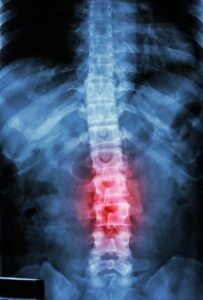By Marlon Redding. Last Updated 15th March 2024. In this guide, we discuss the question ‘Can I claim for a back injury at work for the NHS?’. There are certain eligibility criteria that need to be met in order to have a valid personal injury claim. We explore these further in our guide as well as the time limits for starting legal proceedings and how a No Win No Fee solicitor could assist you with claiming compensation for a back injury at work.
Additionally, we discuss the duty of care employers have towards their employee’s health and safety while at work. Furthermore, we discuss some common causes of a back injury at work.
We hope you find this guide useful, but if you’re looking for further information and guidance relating to your own case, we’d be happy to provide this to you over the phone. We could also connect you with a personal injury lawyer from our panel that could help take your claim forward.
To access free claims advice, why not call our helpline on 0161 696 9685?
Jump To A Section
- Can I Claim For A Back Injury At Work For The NHS?
- How Long Do I Have To Start A Back Injury At Work Claim?
- What Could Cause A Back Injury At Work For The NHS?
- How Much Compensation For A Back Injury At Work Could I Get?
- Could I Use A No Win No Fee Solicitor To Claim For A Back Injury At Work For The NHS?
- Additional Resources On Accident At Work Claims
Can I Claim For A Back Injury At Work For The NHS?
Your employer must take reasonable and practicable steps to prevent you from experiencing harm in the workplace. They have a legal responsibility in this regard, also known as a duty of care, which is laid out in the Health and Safety at Work etc. Act 1974.
If they fail to look after your health and safety at work, and you suffer an injury because of their failure, you may be able to claim compensation for the pain and suffering of the harm you suffered as well as any expenses associated with it. However, you need to prove the following:
- A duty of care was owed at the time and place of the accident.
- This duty of care was breached.
- You suffered a physical and/or psychological injury as a result.
This is negligence and needs to be proven for you to have a valid personal injury claim. Call on the number above for more information about the question, ‘Can I claim for a back injury at work for the NHS?’.
How Long Do I Have To Start A Back Injury At Work Claim?
You must start your back injury at work claim within a certain time limit. Generally, as per the Limitation Act 1980, this is three years from the date of the accident but some exceptions can be made in the following cases:
- The injured party was/is under the age of 18
- The injured person lacks the capacity to start their claim
For those under the age of 18 at the time of suffering your back injury at work, the time limit to start a claim will only begin on the date of their 18th birthday. The claimant will have three years from this date.
However, the time limit is suspended until this date. During this suspended period, someone can be appointed a litigation friend to claim on their behalf.
People who lack the mental or physical capacity to start their claim can also be granted an extension. Their time limit can be frozen until they are once again able to represent themselves. Like people under the age of 18, a litigation friend can be appointed to represent them.
As we have said, you can reach out to an adviser for any more questions you may have about claiming for a back injury at work.
What Could Cause A Back Injury At Work For The NHS?
There are various issues that could cause an NHS accident at work that leads to a back injury. According to the Health and Safety Executive (HSE), the most common causes of back pain in employees across all sectors include:
- Lifting bulky or heavy loads
- Carrying loads in an awkward manner
- Dragging, pushing or pulling heavy loads
- Repetitive tasks (packing etc.)
- Stretching, twisting and reaching
- Manual handling tasks that take place in awkward places
- Crouching, stooping or bending
- Working when physically overtired
Call to discuss your specific case and find out whether you could claim compensation for a back injury at work.
How Much Compensation For A Back Injury At Work Could I Get?
For a successful accident at work claim, you could receive a compensation payout comprising general damages and special damages. General damages compensate for the pain and suffering of your injuries whilst special damages compensate for the financial losses incurred as a result.
When calculating the value of general damages, reference can be made to the guideline award brackets from the Judicial College Guidelines (JCG). These correspond to different types of injuries varying in severity, including back injuries.
You can find a selection of figures from the JCG in the table below, except for the top entry. Please use the table as a guide only as the compensation for a back injury at work that you receive will differ depending on your specific case.
| Back Injury Severity | Further Notes | Compensation Bracket - Guidelines |
|---|---|---|
| Multiple Severe Injuries with Financial Losses | Compensation for the effects of multiple severe injuries, including the pain and suffering and the financial losses incurred, such as lost income, care costs, and medical bills. | Up to £500,000+ |
| Severe (i) | The most severe of injuries causing spinal cord damage and damage to the nerve roots. This could lead to severe combinations of consequences that aren’t normally present in back injury cases. Disability and pain would be severe, and this could be combined with incomplete paralysis, significant impairment of sexual, bladder or bowel function. | £91,090 to £160,980 |
| Severe (ii) | Cases in this bracket would usually have outstanding features that set them apart from other orthopaedic back injuries. Nerve root injury with sensation loss, impairment of mobility, scarring and impaired bowel or bladder function could feature. | £74,160 to £88,430 |
| Severe (iii) | Fractures of vertebral discs, disc lesions, fractured discs that lead to chronic condition that leave disabilities despite treatment. These could lead to severe discomfort and pain, impairment of agility or sexual function, personality changes, risk of arthritis, depression and alcoholism. | £38,780 to £69,730 |
| Moderate (i) | Residual disabilities less severe than above. One example of an injury that could be in this bracket could include a crush fracture of the vertebrae in the lumbar region, where the osteoarthritis risk is substantial and there is discomfort and pain that is constant. | £27,760 to £38,780 |
| Moderate (ii) | Those that are more frequently experienced such as ligament and muscle damage that lead to backache, or those that accelerate or exacerbate previous conditions. | £12,510 to £27,760 |
| Minor | Less serious disc prolapses, soft tissue injuries, strains and sprains. Duration and severity would usually dictate the amount awarded. Figures featured are for injuries that heal within two to five years | £7,410 - £11,730 |
What Are Special Damages?
Special damages may also be payable as part of a successful claim for a back injury at work. They could include:
- Care expenses
- Medical costs
- Travel expenses
- Loss of earnings
When claiming back costs incurred because of your injury, make sure you keep hold of your receipts and bills. Without evidence, you may not be able to recover the fees.
Call for further guidance on the question ‘What compensation can I claim for a back injury at work for the NHS?’.
Could I Use A No Win No Fee Solicitor To Claim For A Back Injury At Work For The NHS?
If you’re eligible, you could instruct a solicitor from our panel to represent your claim. They can offer their services via a Conditional Fee Agreement (CFA) which is a type of No Win No Fee contract. Typically, this means:
- No upfront or ongoing costs for your solicitor’s services.
- No fees to pay for the solicitor’s work if your claim fails.
- If your claim succeeds, you will pay a success fee to your solicitor. This is taken as a legally capped percentage of your compensation. As such, you keep the majority of your settlement.
Contact Legal Helpline About Your Claim Today
If you have sustained a back injury at work as an NHS worker, and you’d like us to assess your case to see if you could be eligible for compensation, then please don’t hesitate to get in touch.
We’d also be happy to answer any questions you might have about these and other healthcare worker injuries. We could even connect you with an experienced personal injury solicitor from our panel who could help you claim compensation for injuries sustained at work.
To get in touch, simply:
- Call our Legal Helpline on 0161 696 9685
- E-mail [email protected]
- Complete our contact form
- Or, use our Live messenger to chat with us.
Additional Resources On Accident At Work Claims
How To Nurse A Lower Back Injury – Here, you can find guidance on dealing with back pain.
Back Pain Treatment Options – Here, you can take a look at the NHS information on back pain treatments.
Back Pain Return To Work Booklet – Here, the NHS has produced a guide to musculoskeletal pain for NHS workers.
- Claiming compensation for an accident at work
- Accidents at work caused by tiredness and fatigue
- Claim compensation for slipping at work and hurting your back
- How to make an NHS accident at work claim
- How to claim compensation for an accident at work during your probationary period
- Why is it important to report accidents in the workplace?
- I was injured due to no workplace training, can I claim?
- Office-based accident at work claims
- How to make a workplace back injury claim
- Employee rights after an accident at work
- Assault at work compensation claims
- Agency worker accident at work claims
- Tendon injury at work claims
- How to make a claim for an injury caused by defective work equipment
- How to claim for a back injury at work caused by lifting?
- Inadequate protective equipment compensation claims
- Ladder accident at work compensation claims
- Stuck in a lift at work? See if you can claim compensation
- Fatal accident at work claims
- Claiming when injured due to lack of work safety boots
- Manual handling claims
- Slip, trip, fall at workplace compensation claims
- Forklift accident compensation claims
- Warehouse accident claims
- Accident working abroad compensation claims
- Construction accident claims
- Self-employed accident at work claims
- Scaffolding accident compensation claims
- Could I be sacked for an accident at work claim?
- Firefighter injured at work claims
- Employers’ responsibilities after a work accident
- Claim for carbon monoxide poisoning at work
- I did not take time off work after an accident, could I claim?
- Chemical burn at work – can I claim compensation?
- Claiming for a work accident after leaving the company
- Do employers pay for work-related injury claims?
- Do you have to be an employee to make a work accident claim?
- Time limits for work injury claims
- Part-time employee injury claims
- I got hurt at work, do I need a lawyer?
- The personal injury claims process explained
- Temporary worker’s rights to claim compensation
- The Management Of Health And Safety At Work Regulations 1999
- Who to notify if a fatal accident occurs at work?
- How to use an accident at work claim calculator
- Fatal accident at work claims guide
- Contractor injured at work – can you claim?
- How many lone workers are attacked every day?
- Bulging disc workers’ compensation claims
Guide by JS
Edited by REG




